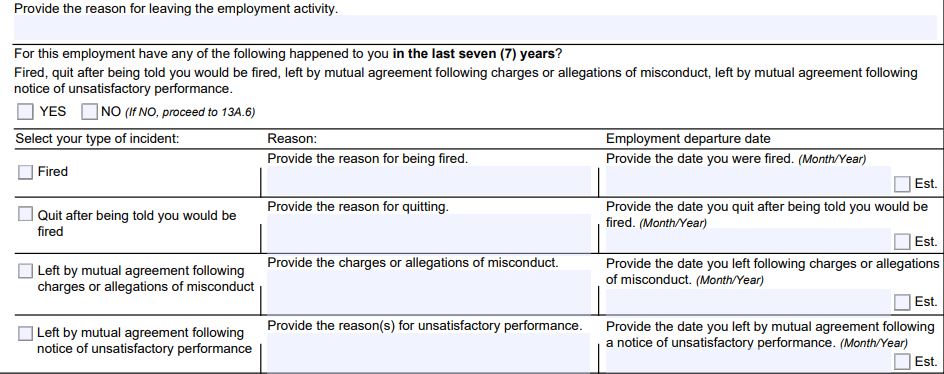For employment listings on the SF-86, the form asks if any of these scenarios have happened in the last seven years:
- Fired
- Quit after being notified of termination
- Left the job following charges or allegations of misconduct
- Left by mutual agreement following unsatisfactory performance
What if your last employer break-up wasn’t so cookie cutter?
One younger security clearance applicant was concerned about listing theirs correctly:
I recently accepted a pathways internship within the federal govt that starts in January, basic facility access. I was previously interning with my hometown city govt. I had been there for about 15 months as an intern and have been working remote for about a year. I was remote because my previous management had allowed me to do so after moving away for grad school.
Fast forward to the beginning of 2022, entire new management came in, the director that hired me and my direct supervisor had all left and were replaced by incoming individuals. I sent a formal letter of resignation (2 weeks’ notice) mid-October, this was accepted by my direct supervisor and a member of HR. In my letter, I clearly outlined what I would complete before I would leave, I had also stated that I was leaving my internship because I had a lot on my plate for grad school by undertaking the most difficult semester thus far and needed the break, my last semester was set to be easy.
2 days prior to my last day, I received an email from my direct supervisor saying that it was my last day because there was a significant discrepancy between my hours lofted and my hours spent working. They pulled this information off one of the main software we use to enter data (it’s important to note that we also use email, our work phones to text, and call people, among other different methods to work). I immediately asked for a copy of the report and vehemently denied the accusation. I never had this issue in the past, and always did the best I could, I was also one of the few people in my office to work remote. Overall, it was really shady, and it ironically came up to me 2 days before my last day, I was never consulted or notified that this was going to happen. I was also in the middle of finishing my last few tasks before this happened. I tried to complain to HR, but they didn’t take it seriously, and didn’t communicate, so I gave up. I have all of the emails on record, as well.
This isn’t my first time completing an SF-86; I have competed a few others with past internships in the federal govt. The questions about previous employment are very specific. “Fired from a job?” “Quit a job after being told you would be fired?” Etc. None of the above happened to me, and I don’t even know if I was terminated or left formally. I tried asking my old HR about it, but they never gave me an answer. What should I say for my upcoming clearance process? Just be honest? Provide the docs? Am I screwed? (Or just overreacting?)
It isn’t uncommon that people experience hard feelings when an employee announces that they are on the way out. We see it with whistleblower cases that issues of misconduct coincidentally come to light once an employee spills the beans on company fraud. Some organizations (and leaders) don’t have the best reaction to the news that someone is quitting. As long as the organization telling you to leave before your two weeks are up is an at-will employer, technically they are working well within their jurisdiction. Companies that employ U.S. workers at-will are not required to keep you on the payroll for that last two-week period – if they are inclined to fire you on the spot, they can do so.
FILLING OUT THE SF-86
As for filling out the form, be honest about the situation – even though the timecard fraud may seem false or embellished after you gave notice, making a false statement on the SF-86 and asking forgiveness later hasn’t always worked well for other security clearance applicants.
Your employer noting timesheet discrepancies before you left could be considered an accusation of misconduct.
Be sure to use all the space you are allowed when filling out the form. For example:
Provide the reason for leaving the employment activity: After formally giving my 2-week notice, I believe I was wrongfully asked to leave due to made up misconduct allegations.
Provide the charges or allegations of misconduct: Timesheet issues.
Having all necessary documentation and correspondence ready to support your case if and when an investigator calls will be helpful. But if there is no pattern of these types of employment issues in your past and this is a one off, maintain candor on all forms and discussions with background investigators.
Much about the clearance process resembles the Pirate’s Code: “more what you’d call guidelines than actual rules.” This case-by-case system is meant to consider the whole person, increase process security, and allow the lowest-risk/highest-need candidates to complete the process. However, it also creates a lot of questions for applicants. For this reason, ClearanceJobs maintains the ClearanceJobsBlog – a forum where clearance seekers can ask the cleared community for advice on their specific security concerns. Ask CJ explores questions posed on the ClearanceJobs Blog forum, emails received, and comments from this site.





